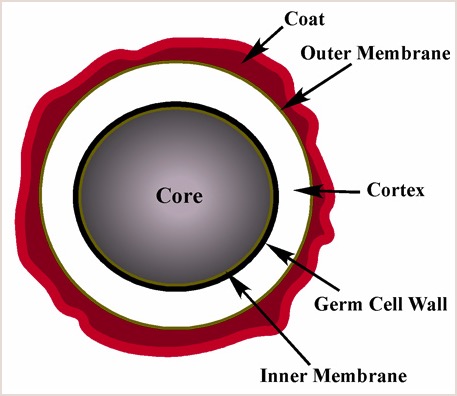It would not be unfair to compare hospitals to Dante's Vestibule of Hell. They are hideous. The food is usually terrible. The rooms are usually terrible. The stench is always terrible. And good luck getting a decent night's sleep. Perhaps you'll have someone hacking up a spleen in the bed next to you or a nurse waking you up at 4 AM to give you a sleeping pill. But the main reason to avoid them is germs. Germs are all over the place. Even when a hospital follows best practices for disinfection, nasties like MRSA, CRE, and C. diff are all over the place.
C. difficile (or C. diff, short for Clostridium difficile), one of the most common nosocomial (hospital-acquired) infections (1), is especially bad news. It flourishes when strong antibiotics, for example, vancomycin (2) are given to treat a serious infection. C. diff is less susceptible to antibiotics, so when gut bacteria are wiped out by a course of antibiotics, especially those that are broad spectrum, it is only too happy to step up and fill the void. This is bad news. An overgrowth of C. diff is very dangerous. It causes severe diarrhea, which can lead to dehydration and inflammation of the colon that can be life-threatening.
As if we needed more bad news, Katie Laird, Ph.D., the Head of the Infectious Disease Research Group at the School of Pharmacy in Leicester, UK and colleagues just published a paper in the journal Infection Control & Hospital Epidemiology which will not make hospital residents sleep any better - literally. The group looked at the presence of C. diff spores on clean bed sheets.
COMING OUT IN THE WASH. OR NOT.
Since C. diff is spread from surfaces, Laird's group was interested in discovering other ways that the bug can be transmitted in hospitals, for instance, sheets. They applied C. diff to a cotton sheet. Then they took sterile sheet (C. diff free) and tossed both of them in the laundry (2) and measured how much C. diff was found and where. It is more than a little disturbing that not only did the C. diff remain in the contaminated sheet but it also spread to the clean sheet! Ewwwwww!

Photo: Memegen.com
A related experiment gave similar results. Sheets that were used by people who had a confirmed C. diff infection were washed in a commercial laundry using industrial detergent and then pressed and dried. The researchers measure the amount of C. diff before and after washing and found that the entire washing process decreased the bacteria by only 40%. Neither the experimental washing nor the normal commercial washing was able to get rid of C. diff spores (3).
SPORES MAKE MATTERS MUCH WORSE
Certain microorganisms form spores - chemical "fortresses" that surround the bacterium and protect it while in a dormant state, sometimes for as long as thousands of years. Then, when the spores sense a better environment, the outer coatings dissolve, releasing the active pathogen. C. diff forms spores; this is one of the reasons it's such a bad actor (Figure 1).

Figure 1. A depiction of a bacterial spore. Note the protective layers, especially the cortex (white). The cortex is composed of a peptidoglycan (amino acids bound to sugars) matrix which makes it resistant to conditions that would kill bacteria. Source: Cornell University
Spores can withstand conditions that would decimate normal bacteria. They are not killed by alcohol or industrial detergents, and they can last for hours at 160°F. Bleach is just about the only common chemical that can destroy them and it had better not be too dilute. It takes a concentration of one part concentrated bleach and 9 parts of water to kill C. diff spores on a non-porous surface, and it needs to remain on the surface for about 5 minutes.
One front on the war against antibiotic-resistant bacterial is improved hospital sanitation. But this may require more vigilance than we thought.
NOTES:
(1) People can catch C. diff in the hospital, but it already exists in your gut. In healthy people who haven't taken antibiotics, C. diff is usually not a problem.
(2) Some microbiological irony: Vancomycin is one the powerful antibiotics that can cause a C. diff overgrowth when given IV. But one of the treatments for a C. diff infection is oral vancomycin. How can this be? Vancomycin is poorly absorbed from the gut. This allows it to accumulate in high concentrations at the site of the infection and kill the same bug it helped cause.



